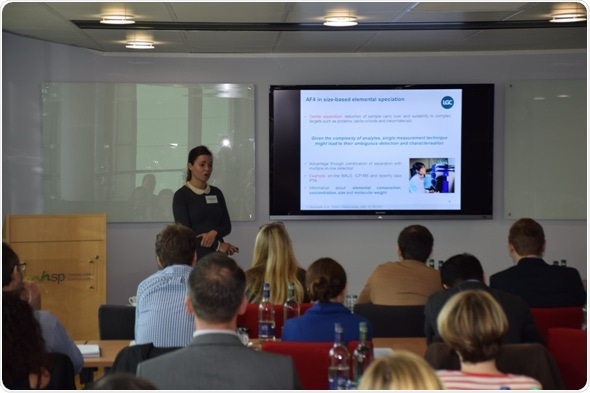Jan 24 2018
Postnova Analytics has announced its second annual 1-day seminar exploring how advanced separation techniques are extending the frontiers of characterization of nanoparticles, polymers and proteins.

Informative scientific exchange at the first Postnova seminar
Following the popularity of the first Postnova first seminar, held at the company’s UK headquarters in Malvern, an informative program of talks from eminent guest speakers, plus presentations from Postnova scientists has been assembled.
The free 2018 seminar, due to held on Tuesday March 6th, has been designed to advance the attendees knowledge of applications and techniques in nanoscale characterization. The seminar will be particularly useful to those interested in using Field-Flow Fractionation (FFF), Size Exclusion Chromatography (SEC/GPC) and Light Scattering/Viscometry (MALS/DLS) as well as those interested in how these techniques may be useful in their research.
Confirmed guest speakers for the seminar include Professor Harold Pasch, University of Stellenbosch, South Africa (FFF for advanced polymer characterization); Professor Joerg Feldmann, University of Aberdeen (Characterisation of natural nanoparticles in pilot whales and in gas condensates); Dr Rosie Staniforth, University of Sheffield, (Abeta protein aggregation in neurodegenerative disease); and Dr Tom McDonald, University of Liverpool, (Analysis of Nanogels by FFF). There will also be presentations from Professor Éva Valsami-Jones, Chair in Environmental Nanoscience, University of Birmingham and Dr Heidi Goenaga-Infante, Principle Scientist, LGC.
Paul Clarke, Managing Director of Postnova Analytics (UK) Ltd said:
We had a great response to the first meeting held just over a year ago and have put together an equally high-quality list of guest speakers for the 2018 seminar. In addition, Postnova scientists will present for the first time in the UK a demonstration of the exciting new Electrical-Flow EAF4 system – a powerful new tool for separation of charged species that is showing a lot of promise particularly in biopharmaceutical applications.